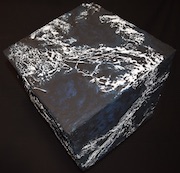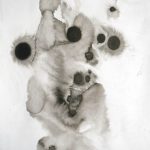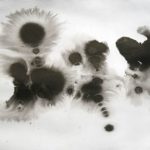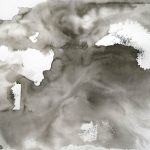KNKUC presents Robert Rich. Interview with Jimmy Empne
This interview that dates from May 2015 now appears in Passcode Magazine #2 (Greece) October 2020 edition.
Q.Hello Robert!Is it true that as a kid…didn’t you like music?In what are you engaged in this time?Do you have any projects in process?
A.I got past my stage of “not liking music” when I was about 8 years old, but I still don’t surround myself with recordings all the time. I like silence. There’s a comment on the Wikipedia page about me that isn’t quite accurate, it repeats a quip I made in some interview years ago. Music was always an important part of my life, I just didn’t like mostmainstream music. I realized when I was young that I had very strange tastes. I might just be a bit oversensitive to stimulus, and many things impinge upon me in a way I don’t like, they just make me want to hide. Television and many movies do that to me. So when I make my own music, I try to make albums that I would want to live inside (and I have to live inside them, when I am working on them.) When I was a kid, I would close my eyes in a darkened room and dream of full worlds spinning inside my head, and those are the worlds I try to build with my music. So it’s hard to imagine hearing this coming from outside of me. This is music from inside a very deep place.I am always working on new ideas. I am trying to solve some technical problems around releasing an 8 hour Blu-ray for a sequel to Somnium, for example.
Q.How do you feel about live concerts, tours and bringing your music everywhere as an ambient performer? It is not a classic pop music live concert or a simple rock band show…Homemade instruments,high quality sound,lonlasting concerts…Is it a challenge or a pleasure for you after 30 years in the music industry? Do you remember any weird or funny moment that took part the sleep concerts back in 80s?
A.I do enjoy performing, although it can be exhausting sometimes. Mostly, it re-connects me to the energetic, shamanic component of this introverted music. It pulls me out of a solitary place and invigorates the music with human connection. The idea of performing electronic music has always been a bit complex, because some elements are not performable. It is impossible to make some of these sounds “live” because they are not instruments, never played, some of them are pure sound design, experiments with digital manipulation. I improvise by combining these elements with live instruments, electronics, looping, and such. I think the process of bringing this experience to other people in person, in a place at a time, adds life to the process. It is the opposite of “virtual”, and I think that is essential to keep the music vibrant. Perhaps the funniest occurrence during a sleep concert was when I was rather sure that a couple was having sex (very quietly) in their double sleeping bag out in the audience, near the outer edge of the room. I had to try hard not to laugh. The music and the audience is very quiet during one of these concerts, so it’s hard to hide. I wondered what the other people around them must have thought… or maybe they were asleep?
Q.What was the equipment for producing music back in the days and what do you think about the evolution in music technology nowadays?
A.The music technology always changes, but it also goes in cycles of fads: digital, analog, tubes, whatever. The gear itself doesn’t matter as much as one’s intention when using the gear. That’s the beauty of the creative force – it guides us in certain directions, and shows us how to manipulate our tools to create something meaningful. When I was starting back in the late 1970’s, early ’80s, I only had enough money to build kits that really didn’t sound very good, and I struggled to make the sounds that were in my head. Yet, when I hear those early experiments, they still contain the essential elements that define my approach to music. For example, on the recent “Premonitions” LP set, I made the piece “Collage for Low Tones” in 1980 with just a few bits of homebuilt electronics, and although it’s crude, you can still hear elements of my more experimental music like on “Bestiary” for example. The relationship between art and the tools goes in both directions. Tools push back on us and limit our options, thus giving inspiration to break barriers and expectations. Musical instruments will suggest certain ways of playing, and then we find new ways to surprise ourselves within those parameters. So, John Cage placed nuts and bolts inside a piano to make it sound like a gamelan. The piano suggested an approach, and Cage used that approach to break through into a new way of playing. The worst thing that can happen to an artist is to have an infinite number of choices. Current music software pretends to give us infinite choices, and oddly it can result in creative stagnation if we are not careful. We are more creative when we have limitations. So, regardless of the developments in musical technology, we are healthiest when we narrow our scope a bit, and learn to focus.
Q.Could you name us five of your favourite films and five of your favourite albums?
A.The list changes by my mood, but here are some, in no particular order:
Films:
– Stalker (Tarkovsky)
– The Sacrifice (Tarkovsky)
– The Seventh Seal (Bergman)
– Baron Munchausen (Gilliam)
– Selene et Julie Vont en Bateu (Jacque Rivette)
Albums:
– Robert Wyatt “Rock Bottom”
– Talk Talk “Laughing Stock”
– Hariprasad Chaurasia and Shivkumar Sharma – Yugal Bandi
– Hamza el Din – Eclipse
– Terry Riley – Shri Camel
Q.Beyond music, how do you handle with your creativity?Are there any other forms of artistic expression in which you have been involved?
A.I never feel quite happy unless I can have the satisfaction of making something, every day if possible. It doesn’t have to be music: I just really like to make stuff. So I guess I have many hobbies, which sometimes become very involved. In some ways, music grew out of the pleasure I got from building electronic kits as a teenager, and also building various projectors for lasers. I still play around with lasers a bit, mostly to use for concert lighting. I was seriously into ceramics for about ten years, mixing my own glazes, with a wheel and a kiln in the basement of our house. Then I got very involved with winemaking from about 2000-2011, and that started taking over the basement instead! Gardening and cooking are wonderful passions, and our small back-yard is edible landscape, with drip irrigation, fruit trees and vegetables. I cook every day, with fresh food that we grow. This feels essential for my sanity, a way to stay firmly grounded in the soil, and tied to the weather and health of the planet.
Q.“Stalker” album with Lustmord…A magnificent piece of work!What are your thoughts about this experience of two masters of sound working together…Do you prefer working alone on tracks or do you like collaborations too?
A.Thank you. Brian and I are very proud of that album. It came together like magic between us, a strongly focused time together. When I collaborate, I definitely prefer to work in person with my collaborator. Otherwise, it isn’t really collaboration. All but one of my collaborations came together this way, in person. The only one that happened long-distance is “Zerkalo” with Faryus (Andrey Sadovnikov), because it was not possible for us to travel easily such long distance between California and St. Petersburg, Russia. In fact Andrey and I have never met.
Thanks Robert for this wonderful interview and for sharing so much information with the Knkuc readers.A few last words for the fans who will read this interview?
Thanks a lot for your time Robert.
Jimmy Empne for KNKUC.
I think our questions are more important than the answers. We must always stay curious.
All the best – Robert Rich






You must be logged in to post a comment.